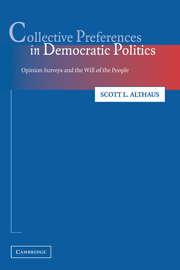Book contents
- Frontmatter
- Contents
- List of Figures and Tables
- Acknowledgments
- 1 Introduction
- PART I ILLUSIONS OF AGGREGATION
- 2 The Power of Noise
- 3 Who Speaks for the People?
- PART II INFORMATION EFFECTS IN COLLECTIVE PREFERENCES
- PART III OPINION SURVEYS IN DEMOCRATIC POLITICS
- Appendix A Political Knowledge Indices
- Appendix B Methodology
- References
- Index
2 - The Power of Noise
Published online by Cambridge University Press: 06 January 2010
- Frontmatter
- Contents
- List of Figures and Tables
- Acknowledgments
- 1 Introduction
- PART I ILLUSIONS OF AGGREGATION
- 2 The Power of Noise
- 3 Who Speaks for the People?
- PART II INFORMATION EFFECTS IN COLLECTIVE PREFERENCES
- PART III OPINION SURVEYS IN DEMOCRATIC POLITICS
- Appendix A Political Knowledge Indices
- Appendix B Methodology
- References
- Index
Summary
Individual voters today seem unable to satisfy the requirements for a democratic system of government outlined by political theorists. But the system of democracy does meet certain requirements for a going political organization. The individual members may not meet all the standards, but the whole nevertheless survives and grows. This suggests that where the classic theory is defective is in its concentration on the individual citizen. What are undervalued are certain collective properties that reside in the electorate as a whole and in the political and social system in which it functions.
– Berelson, Lazarsfeld, and McPhee (1954: 312)We concur with the usual empirical assessments regarding the bleak distribution of political awareness, interest, and sophistication within the American electorate. This book offers no claim that individual citizens are any more capable than the experts say to be the case. Our claim instead is that macro-level dynamics are driven by an electorate where, in the aggregate, the more politically capable citizens possess dominant influence. … A major part of the argument is the reduction of noise due to the “miracle” of aggregation.
– Erikson, MacKuen, and Stimson (2002: 428–9)In almost every political theory there is an inscrutable element which in the heyday of that theory goes unexamined. Behind the appearances there is a Fate, there are Guardian Spirits, or Mandates to a Chosen People, a Divine Monarchy, a Vice-Regent of Heaven, or a Class of the Better Born. The more obvious angels, demons, and kings are gone out of democratic thinking, but the need for believing that there are reserve powers of guidance persists.
– Walter Lippmann (1922: 162)- Type
- Chapter
- Information
- Collective Preferences in Democratic PoliticsOpinion Surveys and the Will of the People, pp. 29 - 58Publisher: Cambridge University PressPrint publication year: 2003



